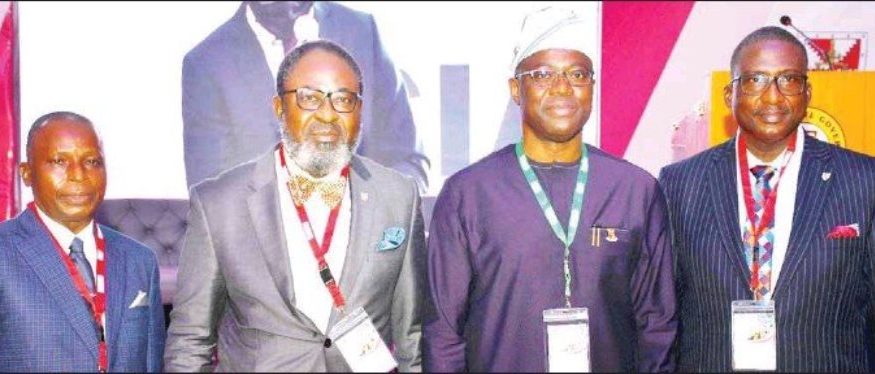The Chartered Institute of Arbitrators UK (Nigeria Branch) held its Annual Conference at Ibadan, Oyo State from 3rd to 5th November, 2021. Below is the text of the communique issued after the highly successful annual conference.
Communiqué of the Annual Conference of the Chartered Institute of Arbitrators UK (Nigeria Branch) held at the Hall of Grace Jogor Event Centre, Ibadan, Nigeria/online from the 3rd to 5th November 2021
Introduction:
Over 600 delegates and about 50 speakers from all over the world registered and participated in the annual
conference physically and virtually at Jogor Event Centre, Ibadan, Nigeria and online with the Conference
theme of “Future perfect: Securing Africa’s ascent on the global ADR stage”.
The Annual Conference of the Chartered Institute of Arbitrators UK (Nigeria Branch) held at the Hall of Grace
Jogor Event Centre, Ibadan, Nigeria/online from the 3rd to 5th November 2021. The program commenced
with the Young Members Group Conference on the 3rd of November and continued until the 5th of November. Various events including an opening session, two plenary sessions, eight parallel sessions and one Oxford style debate alongside other events like networking breakfast, gala night and golf tournament were part activities within the period.
The Governor of Oyo State, His Excellency, Seyi Makinde declared the conference open, and the keynote
address was given by the Honourable Minister of the Federal Ministry of Works and Housing, His Excellency
Babatunde Raji Fashola, SAN.
In the Course of the Three (3) days conference with the delegates and speakers discussing the theme of the
conference, with the following sessions that critically looked at the following sub themes:
– Evolving areas and practical tools for practitioners
– Nigeria as a seat of international arbitration – a closer look.
– IP, Data Privacy and sharing in arbitral proceedings.
– Facing moral and ethical dilemma: what would you do?
– Cyber security issues in arbitration: best practices.
– Developing diversity in arbitration: advocacy and tribunal secretaries.
– Africa Rising: Enhancing efficiency in the arbitral process.
– Insolvency and Arbitration: Dealing with post-covid disputes.
– An hour with African Arbitrator Sages: A mentoring session.
– Climate change and Green arbitration: Need for adaptation.
– Around the world in 60 minutes: Hot topics in international arbitration and mediation.
– Civil Justice and Mediation: Overview of developments in commercial mediation (Oxford Style Debate).
Which sought to address questions such as:
1. Can Nigeria be considered as a friendly seat for arbitration, does Nigerian laws and courts actively support
the arbitral process and does the country have adequate infrastructure?
2. How can a party protect its trade secrets shared during arbitral proceedings?
3. To what extent can data or other information be privileged such that it cannot be shared?
4. What are the professional obligations or duties of parties in ADR proceedings?
5. Are specialized international ethical rules needed, and if so, how would they relate to existing national
rules?
6. What are the cyber-security risks inherent in the use of technology in arbitration proceedings?
7. What are the guidelines, protocols, and rules that have been established by arbitral institutions and
professional bodies?
8. What progress has diversity brought to international arbitration?
9. How can Africa take advantage of its very pivotal role in global commerce and business to promote a more
afro-centric practice of arbitration?
10. What are the potential challenges that insolvencies induced by the evolving covid-19 pandemic, likely to
pose to arbitrations, arbitrators, and practitioners?
11. What are the aims and objectives of the green arbitration campaign?
12. What is the green arbitration pledge and protocol and how can it enhance the development of greener
arbitration in Africa and Nigeria in particular?
13. Can parties to a civil dispute be compelled to participate in ADR processes under the extant Nigerian law
and does the constitution of the Federal Republic of Nigeria, the High Court laws, and the various rules of
court permit this approach?
The following conclusions were agreed upon,
ADR is increasingly being used in Africa as it is aligned with the African concept of justice. Foreign direct
investment into Africa and intra African trade is increasing in value and numbers, hence the argument for the
use of ADR is even stronger.
1. There is a need to inject new innovations and improve the overall process of ADR in Nigeria. Investors want
alternative dispute resolution methods that are efficient and affordable and the use of ADR will help to
reduce the burden on the courts and improve access to justice.
2. There is a general misconception about what arbitration and ADR is by parties and Counsel. The CIArb
Nigeria should adopt strategies to develop awareness and advocacy on the general use of ADR by
disputants.
3. There must be punitive costs on parties that resort to litigation after they have decided to submit their
disputes to arbitration via their arbitration clause. Parties who head to court rather than following the
dispute resolution clause should be sanctioned for not respecting the sanctity of the arbitration clause
mutually entered into by parties.
4. The Chartered Institute should drive the narrative on ADR in Africa because Africa’s size, geographically
and demographically is a major advantage for the continent. The major thing that stands in the country’s
way is ADR practitioners and users who refuse to retain their dispute resolution on the continent and
appoint African practitioners.
5. Factors that parties consider in choosing whether a country is arbitration friendly.
1) Look at the party’s country anti-corruption policy
2) Contractual dynamics
3) Subject matter of the dispute
4) Issue of neutrality
5) Security and
6) Need for specialized judges and not specialized courts
6. Arbitrators must ensure data protection, retention and destruction; identify the confidential data and
utilise platforms that will ensure the protection of such data.
7. Confidentiality is one of the hallmarks of arbitration and arbitral tribunals must ensure privacy especially
as sensitive information be given during the hearings, the arbitrators in such disputes must ensure that the
information is protected and kept confidential.
8. An Investment Protocol under AfCFTA will provide common protections for investors across all African
countries and provide a means of redress for settling disputes amongst private parties. It will ensure
greater certainty of investor protection as “Investment” will have the same meaning cross Africa.
9. Every player in the arbitration space must take the issue of diversity seriously, and there must be a joint
effort between all stake holders. Law firms, ADR institutions and parties should address the issue of
diversity. ADR institutions have a role to play in inclusion and diversity, the arbitral institution should put
issues of diversity into consideration when constituting arbitral tribunals.
10. Diversity in the constitution of the tribunal does not really impact on the impartiality and independence
of the arbitrators. Generally, arbitrators are supposed to be impartial and independence, so diversity is
not going to have much influence on the impartiality and independence of the arbitral panel.
11. Hard work, perseverance, dedication, continuous training and passion will assist in positioning CIArb
members for arbitration work. Mentorship and development of various schemes will be improved to
provide more opportunities for members.
12. There is need for the inclusion of arbitrators from other professional backgrounds in our membership.
Arbitral Institutions should encourage appointment of arbitrators from other professions when
constituting arbitral tribunals due to specialisation and overall competence in the determination of certain
disputes.
13. There should be diversity in the constitution of the arbitral tribunal and appointment of an arbitral secretary to ensure an all- inclusive tribunal that represents diversity such as gender, age, ethnicity, geography and such criteria.
14. The risk of cyber hacking and mishandling of confidential information is real. It is important for an
arbitrator to be aware of the necessary data protection laws and its applications to avoid personal liability
and misconduct.
15. For an arbitral tribunal to be liable for misconduct, such misconduct needs to be identified and proven.
Parties are called upon to comply with directions by the Tribunal and Members are also to ensure adherence
to professional ethics always.
16. The Green Protocols from the Campaign for Greener Arbitration primarily focuses on three critical areas
in which changes in the behavioural practices of arbitration practitioners could have the largest impact in
substantially reducing carbon emissions. The arbitration community is encouraged to:
a. Adopt clean forms of energy,
b. Reduce or eliminate long-haul travel and,
c. Minimize waste, for example by eliminating hard copy fillings altogether.
17. Arbitral institutions across Africa should provide protocols on remote/virtual hearings and support the
digitalization of arbitration to reduce the carbon footprint in the conduct of arbitrations.
18. Arbitration clauses that provide for procedural meetings and oral evidentiary hearings to be conducted
remotely or virtually should be included in drafting such agreements.
19. Access to the delivery of civil justice is enhanced when parties can voluntarily make use of all forms of
alternative dispute resolution methods particularly mediation and arbitration for both domestic and
international disputes. It is therefore important that policy makers in the judiciary and legislature support
and enhance the use of ADR in decongesting the courts and making civil jurisprudence more efficient and
accessible to parties.
Signed by:
Prince Lateef Fagbemi SAN Richard Ayodele Akintunde SAN
Co-Chair, 2021 Conference Planning Committee Co-Chair, 2021 Conference Planning Committee
Copyright 2020 CITY LAWYER. Please send emails to citylawyermag@gmail.com. Join us on Facebook at https://web.facebook.com/City-Lawyer-Magazine-434937936684320 and on TWITTER at https://twitter.com/CityLawyerMag. To ADVERTISE in CITY LAWYER, please email citylawyermag@gmail.com or call 08138380083. All materials available on this Website are protected by copyright, trade mark and other proprietary and intellectual property laws. You may not use any of our intellectual property rights without our express written consent or attribution to www.citylawyermag.com. However, you are permitted to print or save to your individual PC, tablet or storage extracts from this Website for your own personal non-commercial use.

